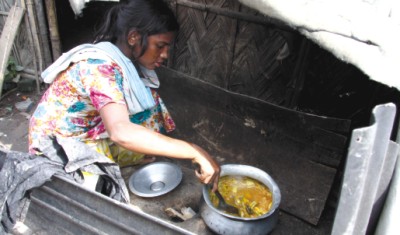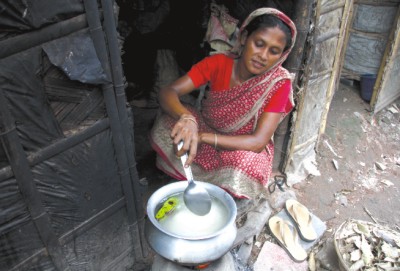|
Economy
Swelling Prices, Shrinking Needs
Farhana Urmee
Holding a folded empty bag in one hand, Shahana comes out of Krishi Market in Mohammadpur to take a moment and catch a deep breath on the street.
Her two-hour effort has turned futile and the idea of shopping seems too awful a thought to contemplate anymore. Shahana hastily changes her decision and begins to head towards another bazaar, this time a comparatively less expensive one in Camper Bazaar, a market in Geneva Camp where the Biharis are the main customers.
 |
| Photo: Zahedul i khan |
As dusk approaches Shahana walks in a hurry. Time is running out on the first day of Ramadan, the holy fasting month for Muslims. Under the scorching heat of the burning sun, Shahana sweats uncontrollably with the frustration of a failed grocery-shopping hunt.
Walking on the semi-paved and uneven city street, she tries to remember the chores still waiting to be finished with the day soon coming to its end. Shahana still has to prepare iftar at home where her two sons are eagerly awaiting her arrival.
“I have to buy something. Ramadan has come with a high price hike on daily essentials. I don't know what to do as I can't deduct my necessities,” Shahana says.
Shahana, a housewife, cannot decide what item to cut off from her list. She needs to purchase chickpeas, soybean oil, sugar, dates, pulse, onions and cucumbers, all of which are must-buys for making regular iftari items, and costs of those have spiraled out of control in Ramadan.
The price of every vegetable item has increased significantly. Even if it has risen from Tk 2 to Tk 5, which as a separate entity may seem like nothing, becomes a huge burden when summed up for someone who runs family in a stipulated budget.
Besides vegetables, Shahana would also have to buy other essentials such as cooking oil, meat and flour. According to the daily retail price data of the Trading Corporation of Bangladesh, the price of unpacked soya bean oil per kilogram has soared to Tk 80-82 from Tk 78-80 and palm oil's price has increased by Tk 1 from Tk 72-74 a kg. She would have managed, had it been some other month of the year, but Ramadan requires more oil. The prices of branded and canned soybean oil has also risen by Tk 4-5 a litre. Price of sugar, too, has gone up to Tk 5 per kilogram just because of the time of year, although there is more-than-sufficient supply in the market.
Unfortunately for Shahana, even the cost of items at Camper Bazaar fails to meet her budget. Another hour has gone by in vain and she can hardly hold back her tears. Suddenly, an idea crosses her mind as she remembers seeing some people selling vegetables on roadside on her way to the market. She decides to continue her hunt over there.
Finally, Shahana gets what she has been looking for. She doesn't wait too long after she finds that vegetables are being sold here for slightly less than the bazaar. She manages to buy some aubergines, onions and cucumbers.
 |
| Photo: Zahedul i khan |
However, she does not have the appearance of a satisfied and successful shopper. After three hours of shopping she is returning back with a bag barely packed with a few things.
“I was wondering whether there is another bazaar in the area where I might find things a bit cheaper. Then I would be able to manage the daily groceries within my budget,” she says. Not in her wildest imagination can she even think about making an entry to the super markets and from now on she is likely to stick to her buying from the roadside peddlers and vegetable-wallas selling from their baskets.
The retailers are explaining the price hike with the usual 'increase in demand' for all ingredients required for iftari items. Thus the soaring prices of chickpeas, dates, sugar, pulses, eggs, chicken, beef, cooking oil, onions, potatoes and other vegetables.
Shahana represents members of the middle class residing in the capital who are struggling to maintain a minimum standard of living.
“Even a few years back, I remember breaking our fast during iftar felt like a celebration. We used to have a variety of dishes to choose from at the table. And after having a hearty meal, we felt tired even to have dinner,” says Shahana.
“But nowadays we still feel hungry even after finishing iftar. We have rice,” she says, adding that she is helpless when it comes to preparing the small menu, which hardly ends up with nothing but one or two conventional iftar items. She cannot have various kinds of fruits, fried items and fresh juice like the old days but has to stick to a glass of less-sweet sherbet and just a few usual items with a plate full of muri or puffed rice.
She cannot help herself as her expatriate husband sends her a certain amount of money every month. This allowance remains the same for them, but is insufficient against the backdrop of prices of essentials spiraling several times every year.
“I make just three glasses of shorbot, for the four of us at my home, and we are even trying to get used to having plain water instead of shorbot, as the price of sugar went up…” says Shahana. She ends up buying grapefruit, guava and pineapple for her family, as these fruits are still cheap.
Others living nearly below the poverty line have also found their own way to struggle against the price hike.
For the lower-income people, it is too late to modify their diets according to nutritional guidelines. They have changed their food habit a long time ago. For most lower income families only one meal a day can be guaranteed, whether it is Ramadan or not.
Hamida, who works as a chhuta bua (part-time maid) in different houses in the city, cooks once a day. She lives with her daughter in Mohammadpur Geneva Camp, and only cooks their dinner. When asked about her meals she laughs and replies that she takes her lunch only if any of her employers offer it; her daughter takes her lunch at her workplace. “I do not need to manage a meal more than once a day,” she answers with a smile, as if amused by her own trick to cope with the price hike of daily essentials by avoiding meals.
People like Shahana are trying to fight the price hike by restricting their needs. At this rate, Shahana's situation might become like that of Hamida's one day. If that happens what will become of people like Hamida if the prices of essentials continue to grow this way?
Copyright
(R) thedailystar.net 2010 |
